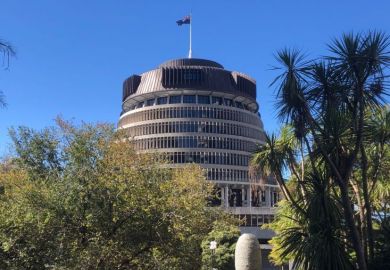New Zealand’s university and research sectors will be supervised by a single minister, with a new advisory council to provide “strategic direction and oversight” of the science, innovation and technology system, under reforms stemming from a long-awaited report.
Outgoing science minister Judith Collins has announced a raft of changes including a new prime minister’s advisory council on science, innovation and technology, and a national policy for research-related intellectual property where ownership will reside with researchers.
Collins also flagged a new agency, Invest New Zealand, as a “one-stop shop” for foreign direct investment. Its remit will be to help achieve a government goal of doubling exports by 2034.
Callaghan Innovation, a government agency that fosters entrepreneurial science, will be scrapped and seven crown research institutes (CRIs) will be folded into four public research organisations (PROs) focusing on bio-economy, earth sciences, advanced technology and health and forensic sciences.
Collins said the four new PROs would “play a role in stewardship of public good science”, but would be designed to maximise the long-term benefits of “NZ Inc”.
The new advisory council will be charged with setting national priorities for the science and technology system so that taxpayer funding is “spent in the best way possible to grow the economy, because innovation and technology are the future”.
The changes were revealed on 23 January, days after prime minister Christopher Luxon announced a ministerial reshuffle that will combine science and universities in a single portfolio.
It will be overseen by ousted health minister Shane Reti, who will acquire responsibility for science and technology from Collins and universities from tertiary education minister Penny Simmonds.
The unified ministerial oversight, advisory council, investment agency, rationalisation of CRIs and scrapping of Callaghan were all recommended in an August report from the Science System Advisory Group, one of two reviews being headed by former chief science adviser Peter Gluckman.
The report, the first of two to be produced by the science advisory group, has now been published. Gluckman said he was delighted that the government had accepted the “core concepts” from the report’s 31 recommendations.
“This is the most substantive change in the science and innovation system since 1991. With the universities now coming under the same minister, it brings more opportunities for a productive knowledge-based society,” he said.
Research funding mechanisms will be addressed in a second report, which Gluckman said would focus on “technical” rather than structural aspects of the science and innovation system. They will include “issues of research prioritisation” and “the government’s own use of science”, and “will be informed by advice from the government in response to the first report”.
The government is yet to respond publicly to other proposals, including a national research council to oversee research funding and a higher education council with a “strategic and coordinating role” over the university system.
Universities New Zealand (UNZ) highlighted “potential risks” in the latter suggestion. “We have a small university system and our vice-chancellors already work closely together with key ministers and agencies on strategic priorities,” said chief executive Chris Whelan. “On the information provided to date it is unclear how another body would complement existing arrangements and deliver better value.”
Whelan said that while there was “a lot of detail to work through” in the report, “there is a lot that we agree with and support”.
UNZ chair Grant Edwards, vice-chancellor of Lincoln University, said the advisory council and the proposed research council were worthy ideas but membership would be “critical”.
University of Auckland vice-chancellor Dawn Freshwater said the government’s changes would need to incorporate “robust systems” to identify funding priorities and measure research impact.
The system would need a “coherent strategy and governance around funding priorities and investments as well as ways of monitoring, evaluating and measuring” its impact and outcomes, she said.
Register to continue
Why register?
- Registration is free and only takes a moment
- Once registered, you can read 3 articles a month
- Sign up for our newsletter
Subscribe
Or subscribe for unlimited access to:
- Unlimited access to news, views, insights & reviews
- Digital editions
- Digital access to THE’s university and college rankings analysis
Already registered or a current subscriber?








